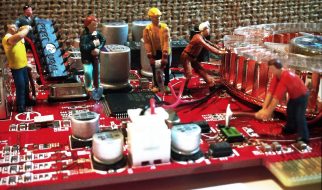On your primary election ballot, you?re likely to see candidates for Congress or state senate but also sometimes the Democratic or Republican ?precinct committeeman.? We wondered who is on this committee, what do they do and what is the precinct? And why do you often see the same candidates for precinct committeeman running for another position on your primary ballot?

What is the precinct? What is the committee?
The precinct is effectively the political equivalent of your neighborhood as the smallest political unit in the country. It?s made up of your neighbors and cannot be divided by legislative, congressional, or supervisor districts.
A Precinct Committeeman represents, on average, 500 voters, and has the power to vote for other Party officials and to make endorsements of candidates, and they are official parts of their state?s Republican or Democratic Precinct Committee. At regular meetings, the committees vote on official party business (i.e. decide on the direction of the local party platform), elect party leadership and Platform Convention delegates (who gets to go to the Republican and Democratic Conventions as representatives of the local party). This committee is only elected during the primary election because it is a strictly political position: you must be affiliated with the party to vote for your party?s local precinct commiteeperson. Otherwise known as PCPs, precinct committeemen can either be elected or appointed with the term of office set at approximately two years from the date of election. The size of the committee depends on the size of the county and state. For instance, Cook County has a Democratic Committeeman for every ward in Chicago and township in the county for a total of 80 committee persons.
Why can you run for precinct committeeman and another position on the ballot?
Since the precinct committeeman is a political position like the Chair of the Republican Party or Chair of the Democratic Governors Association, any elected official can run for an elected position and political position. They can legally hold both positions. In fact, this is a fairly common practice for local elected officials, who use precinct committees to maintain power in their local political parties.
What do they do in your community?
Precinct Committee Persons are the people that are legally and electorally responsible for getting out the vote on Election Day. They canvass, deliver campaign literature and serve as year-round campaign volunteers for their political party in every election. They can introduce themselves as the ?Democratic Precinct Committeeman? when they knock on your door, immediately giving themselves a legitimacy no one else in your community has.
Additionally, PCPs can gain and hold the respect from other elected officials with the power to make endorsements of candidates, contact elected officials on the behalf of their constituents, and vote for elected officials to rise through the ranks of the party. PCPs directly vote on the adoption of the Party Platform, the selection of candidates to appointed positions and more.
The Precinct Committee Person is a launching pad for a political career for anyone who is not already elected because it gives them access to elected officials from a respected position other than constituent.
What oversight is there over them? How many are there?
None. Other than other members of the party who see them and their actions, it?s very hard to track the actions of precinct committee persons. In fact, while Census data counts more than 511,000 elected officials in the United States, this does not include the thousands of precinct committee persons. Some counties don?t even have them! In Texas, several counties do not have Democratic PCPs because the party apparatus does not exist in some areas. While the position appears on the ballot, it is not regulated by the government beyond the election (if the PCP is elected in that county).
Can you run to be PCP?
Yes! In fact, it is arguably the easiest elected position to run for in the United States, with the fewest requirements, responsibilities, public accountability and competition on the ballot. In most counties, you just have to fill out a form and wait to be officially confirmed with the primary election. There is no campaigning or fundraising to be done typically because it?s an uncontested position in most cases.The position can give you inside access into the Democratic and Republican parties at the low cost of qualifying for the primary ballot.
BallotReady is the only nonpartisan online voter guide that provides personalized, easy-to-use, and accessible information about your ballot. From the top of the ticket to the very bottom, BallotReady helps voters compare candidates based on stances on issues, biography, and endorsements. We make it easy to vote informed on every race and referendum. See every race and referendum on your Ballot here!
By Mikala Cohen, BallotReady Blog Intern


